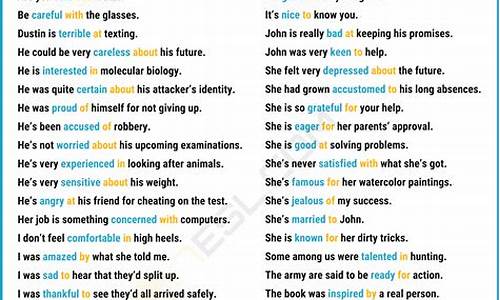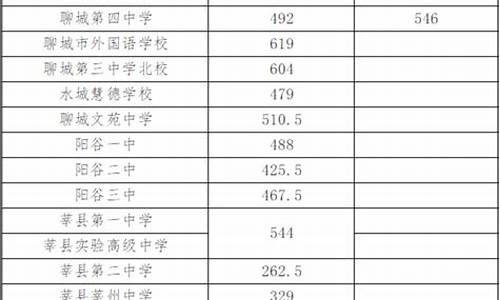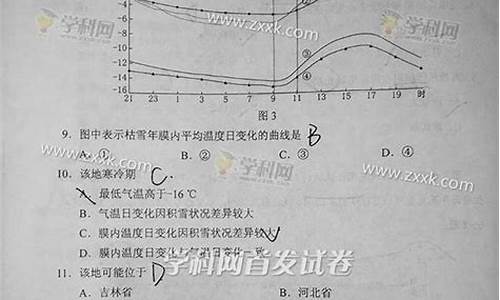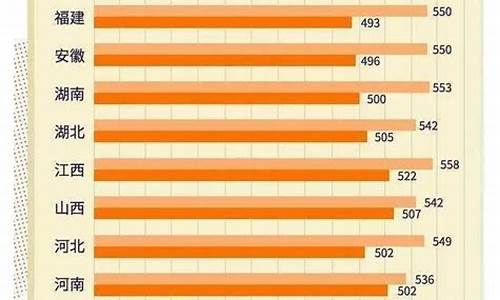介词高考题_高考介词用法
1.高考英语语法:省略介词的七种
2.英语语法
3.BY 介词中怎么用
4.高考英语语法填空常填的虚词(介词、连词、冠词、代词、情态动词)有哪些,能帮我分类列举吗?
5.高考英语语法:高中英语语法-透视“吊尾介词”用法
6.在定语从句中,什么时候用关系代词,什么时候用关系副词,什么情况下用“介词+关系代词”,要高考了,

您好,希望对你有帮助。
高考常用动词短语归纳:
look 的常用短语:look up … in查找
look sb. up and down 上下打量
look back to/ upon回顾
look upon…as把… 看作
look forward to期待
look through浏览; 看穿
take a new look呈现新面貌
fear的常用短语:in fear害怕地
(be) in fear of 害怕
for fear of/ that担心;生怕
concentrate 的常用短语:concentrate on 专心…
concentrate one’s mind on 专心于…
类似的短语:
fix one’s mind upon
focus on
put one’s heart into
focus one’s mind on
surprise常用短语:in surprise惊讶地
to one’s surprise 使某人惊讶的是
be surprise at/to do/that
对某事感到惊讶
表示“穿衣”的动作或状态的词和短语1.表示动作的有:
pull on
put on
dress
dress sb
2. 表示状态的有:
wear
be in
be dressed in
have … on
常见表“喜欢”的短语和单词like
care for
be keen on
be fond of
take delight in…
trouble的常用短语:have much trouble / no trouble (in) doing 在…有/没有困难
take great trouble to do
不辞辛劳做某事
put sb to the trouble of doing …
为难某人做某事
make trouble捣乱
be in (great) trouble
惹麻烦;处在困境中
help sb. out of trouble
帮某人摆脱困境
end的常用短语:come to an end……结束
put an end to 结束……
on end竖起, 连续
in the end终于; 最后
end up (by) doing…以……结束
make both ends meet收支相抵
表示“导致”、“由…引起”的短语:1. 导致
cause sth. (to do)
result in
lead to
2. 由……引起
be caused by
result from
grow out of
lie in
表“全力以赴”的短语:do / try one’s best
spare no efforts to do
take great pains to do
go all out to do
do what somebody can (do) to do
do all somebody can (do) to do
direction常用短语:in (the ) direction of….朝……方向
under the direction of ...在……的指导下
follow the directions照说明去做
far常用短语:far from (being)离……要求相差很远
far from +(a place)距离某地很远
far away遥远
so far 到目前为止; 那么远
as far as sb. knows/sees据某人所知
by far
(最高级前,比较级后)起强调作用
distance常用短语:in the distance在远处
from/ at a distance从远处
keep sb. at a distance
于某人保持一定距离
It is no distance at all.不远
use常用短语:used to do过去曾经、常做
be used to doing …习惯于……
be used to do被用来做……
make good/ full use of充分利用……
come into use开始使用……
it is no use doing …干……没有用
“出了什么事”的几种不同表达What’s wrong with….?
What’s the matter with…?
What’s the trouble with…?
What happened (to sb.) ?
“众所周知”常用表达法:It is known to all that…主语从句,that不能省
As is known to all,定语从句,置于句首
We all know (that)后接宾语从句
Everyone knows (that)后接宾语从句
, which is known to all.非限定从句,置于句末
表“同意某人意见”的常用短语:agree with sb. /what sb. said
agree to sth.
approve (of) sth.
in favour of sth.
be agreeable to sth.
be for sth.
“不同意”
disagree with sb./ what sb. said
object to sth.
disapprove (of) sth.
be against sth.
sign的常用短语:sign one’s name签名
sign to sb (not) to do sth.
示意某人(不)做某事
signs of …
……的迹象
would rather 与 prefer 的区别1.宁愿做……而不做……
would rather do A than do B
prefer A to B
prefer to do A rather than do B
2. would rather 主语 + 过去式,表示“宁愿”
eg. I would rather you came tomorrow than today.
should prefer sb. to do sth./ should prefer 主语 + 过去式,表示“比较喜欢……”
eg. I should prefer you not to go there alone.
OR: I should prefer that you did not go there alone.
trap常用短语be caught in a trap落入圈套
be led into a trap中圈套
set a trap to do sth.设圈套……
be trapped in sth.被…..所围困
grow常用短语in the grow of在….成长中
grow up长大; 成长
grow rich on靠….. 变富
grow into长成……
grow out of由…..引起/滋生出
make常用短语be made up of =consist of 由……组成
make up for弥补
be made from/ of由……造成
make up编造;组成;化妆
be made into制成……
make fun of取笑; 嘲弄
make a living 谋生
supply, provide, offer 的区别:
1.表示“向某人提供某物”
supply / provide sb. with sth.
supply / provide sth. for sb.
supply sth. to sb.
offer sb. sth.
2. 表示“主动提出做某事”
offer to do sth.
3. 表示“倘使”、“假如”
provided / providing that
= on condition that
=only if
4. 表示“满足需要”supply / meet a need.
supply的常用短语in short supply 缺乏,不足
medical/military supply医疗/军用品
supplies of…许多
lack的常用短语be lacking in sth. 在……不足
make up for the lack of
弥补……的不足
for/by/from/through lack of…
由于…不足,缺乏
have no lack of不缺
damage的常用短语do damage/harm to 对……有害
cause damage to 对……造成损害
ask for damage要求赔偿
die of 与die from 的区别
die of 表示“死于……病”或冻死、气死,或死于过度悲伤。
die of cancer/grief/hunger/anger/cold
die from表示死于外伤、事故、劳累过度。如:
die from polluted air/overwork/sword thrust
die常用短语die for one’s country为国捐躯
die down熄灭、平息
die off绝种、枯死
die away消逝、静下来
die a heroic death英勇牺牲
threaten常用短语threaten sb. with sth.用……威胁某人
threaten to do…威胁做……
under the threat of…在……的威胁下
speed常用短语speed up加速
at the speed of…以…..的速度
with great speed迅速
aim常用短语take aim at瞄准
reach an aim达到目的
aim at瞄准、针对
permit与allow 的区别
表“允许做某事”或“允许某人做某事”用法基本相同。
permit/allow doing sth.
permit/allow sb. to do sth.
permit /allow of sth
一般在独立主格结构中表示“时间、条件等许可”,多用permit
Time/Weather permitting, I’ll drop in on her.
allow 还可以表示“承认”、“考虑到”。例如:
1. We allow him to be wronged.
2. will take an hour to go there, allowing for traffic delays.
means常用短语by means of通过….., 靠……
by this means/ in this way用这种方法
by no means/in no case决不
by all means用一切办法
keep常用短语keep up with紧跟…..
keep sb. doing sth.让某人一直做
keep sb. from doing sth.阻止…..做……
keep off the grass勿踏草地
keep to the point紧扣主题
keep in touch with与……保持联系
mark常用短语make one’s mark成功、出名
be marked with标明
gain/get full marks for ……得满分
seat常用短语take one’s seat坐下
have a seat请坐
see/find sb. seated看见/发现某人坐在….
be seated就座, 坐着
seat oneself in/at/on使自己坐在……
部分 动词+ to + doing 的用法
look forward to
get down to
object to
devote… to…
pay attention to
prefer…to…
give常用短语give up放弃
give in让步\屈服
give off 散发出
give away赠送、泄漏
give rise to 引起……
give out 疲劳、用完、散发出
fit常用短语be fit for适合
keep fit/keep healthy保持健康
be fit to do 适合于…..
fit in with适应……
a nice fit合身的衣服
…fit sb.某人穿….. 合身
reach 常用短语reach an agreement达成协议
reach for…伸手去拿/够……
within / out of reach够得到/够不着
reach sb’s understanding 使某人明白
feed常用短语feed sth. to sb/feed sb. on sth. 用……喂养……
be fed up of…/ be tired of…/ be bored with…
对……感到厌倦
feed on以……为食
mercy常用短语without mercy残忍地
have mercy on /upon 对……表示怜悯
at the mercy of任凭摆布
beg for mercy 乞求饶恕
exist常用短语exist in/lie in/consist in存在于……
in existence 现存的
come into existence/ come into being 形成
opinion常用短语in one’s opinion =in the opinion of sb.在某人看来
have a high/ low opinion of
对……评价高/低
give one’s opinion on
对……谈自己的看法
persuade常用短语persuade sb. to do =
persuade sb. into doing
说服某人做某事
try to persuade sb. to do
试图说服某人做某事
persuade sb. to sth.
说服某人同意某事
engage 常用短语be engaged to sb.
与某人订婚
be engaged in sth. =
be engaged doing sth.
忙于……, 从事某事
wide 与broad 的区别
它们均可以表“宽”和“广阔的”
a river 50 feet wide/ broad
指身体部位“宽肩、宽背”一般用broad, 表示
“睁大眼睛、张大嘴巴”一般用wide。
broad shoulders/ back
with wide eyes
open one’s mouth wide
wide 还可以作副词,表示“完全、大大地”
be wide awake
be wide open
sure常用短语be sure of/about
对……由把握
be sure to do sth.
肯定会……
make sure + that-clause
务必……,一定要……
make sure of…
弄清楚……
experience 常用短语have experience in…
在……有经验
be experienced in…
在……有经验
pain 常用短语take great pains to do
努力做某事
spare no pains to do
全力以赴做某事
stick 常用短语stick to sth.
坚持……
stick …on…
粘贴……
be stuck in …
陷进……
stick no bills
请勿张贴
spare 常用短语spare money/time for
省出钱…,腾出时间
in one’s spare time
在某人业余时间
spare no efforts to do
不遗余力去做
don’t spare the opinions
不要保留意见
put down的不同含义put down (one’s knife and fork) 放下……
pit down the rebellion
镇压
put down what sb. says
记下,写下
take up 的不同含义take up a hobby
培养……
take up football
开始……
take up the work
继续……
take up…time/space
消耗,占据……
take up a post
就职
take up a song/ cry
跟着一起……
habit 常用短语form/get the habit of
养成……习惯
be in/have the habit of
有…….习惯
get into the habit of
沾染了……恶习
get rid of the habit=
grow out of the habit=
break away from the habit
改掉了……习惯
高考英语语法:省略介词的七种
be / get / become used to 习惯于
be given to 喜欢;癖好
be related to 与?有关系
be addicted to 沉溺于;对?上瘾
be opposed to 反对
devote oneself to献身于;专心于
be devoted to 致力于;忠诚于
be admitted to 被?录取;准进入
be reduced to 沦为
reduce?to?使?沦为
be attached to附属于;喜欢;依恋
be adjusted to 适应
be known to 为?所知
be married to 和?结婚
be sentenced to被判处
be connected to 和?连在一起
be exposed to 暴露于;遭受
be compared to 被比喻成
compare? to?把?比作?
be engaged to 与?订婚
be / become / get accustomed to // accustomed to 惯于;有?习惯
be engaged to 与?订婚
get down to 着手做
lead to 导致
object to反对;不喜欢;不赞成
put one?s mind to全神贯注于
give rise to 引起
look forward to 盼望
stick to 坚持
pay attention to 注意
attend to 专心;注意;照料
see to 负责;注意
contribute to对?作贡献;有助于
make contributions to对?作贡献
apply oneself to 致力于
come close to几乎;将近
reply to 回答
add to 增加
add up to 加起来
in addition to除?之外
turn to转向;求助于
feel up to 能胜任于
look up to 尊敬
admit to承认
belong to 属于
take to 喜爱;开始
cling to 附着
fall to 开始
respond to 回答;对?作出回应
accustom oneself to 使自己习惯于
amount to等于
prefer? to?更喜欢
set an example to 给?树立榜样
refer to 谈到;参考;查阅
agree to sth. 同意某事(比较:agree to do sth. 同意做某事)
prefer? to?更喜欢
take / make a trip to到?地方去
join?to?把?和 ?连接起来
turn a blind eye to对?视而不见
turn a deaf ear to 对?充耳不闻
show honor to向?表示敬意
put an end to(bring? to an end) 结束
set fire to 放火烧?
drink (a toast) to 为?干杯
propose a toast to 提议?
happen to? 发生了?事
occur to sb. 想起;想到
total up to 总计达
be close to 几乎;将近
hold to 坚持;抓住
help oneself to 随便用?
hold on to 抓住;固守
do harm to 对?有害处
do wrong to 冤枉某人
date back to 追溯到
when it comes to? 谈到?时
come to 来到;达到;结果为 (比较:come to do sth逐渐做某事)
give an eye to着眼于
have an eye to doing 打算
the key to ?的答案
describe to 向?描述
treat sb. to sth. 请某人吃?
trust sth. to sb.把某物委托给某人
pay a visit to 参观?
access to 进入;取得的方法
be a stranger to 不习惯;对?陌生
on one?s way to 在去某处的路上;在达成某事的过程中
be kind to 对?和善
be important to 对?重要
be senior to 年龄长于?
be equal to 和?相等
be particular to ?所特有的(比较:be particular about 对?过于讲究;挑剔)
be subject to 服从;隶属;易遭\受\患
be familiar to 为 ?熟悉
be similar to 和?相似
be open to 对?开放
be loyal to 对?忠诚
be helpful to对?有益处
be useful to对?有用
be good to sb对某人好(比较:be good for 对?有益处)
be bad to 对?不好
be bad for(比较:对?有害处)
be new to 对?不习惯;对?陌生
as to 关于;至于
next to(否定词前)几乎;
be due to do sth.预定要做某事
next to ?的旁边
due to 由于;归因于?
thanks to 多亏了;由于
owing to 由于;因?的缘故
in / with regard to 关于
in /with relation to 关于;就?而论
subject to 在?条件下;依照
be given to 沉溺于
be related to 与?相关
get down to着手做
lead to 着手做
object to / be opposed to 反对
put one?s mind to全神贯注于
be equal to 胜任
devote oneself to献身于
give rise to 引起
look forward to 盼望
pay attention to 注意
lead to通向 see to 负责
access to 接近(某地的)方法
be addicted to 沉溺于? 对?上瘾
according to 根据
contribute to 为?作贡献
如:
1. access to 接近,进入(某地的)方法; 通路
The only access to that building is along that muddy track.
到那栋建筑的唯一通路是沿着那条泥泞的路走。
2. according to 按照,依照,视?而定
The work was done according to his instructions.
那工作是依照他的指示做的。
3. be addicted to 沉溺于?,对?上瘾
He became addicted to the drug.
他上了毒瘾。
4. belong to 属于
This dictionary belongs to me.
这本词典是我的。
5. contribute to 为?做贡献,为?撰稿
Everyone should contribute what he or she can afford to society.
人人都应该尽自己的能力为社会做贡献。
6. devote to 献身,致力于?
He has devoted his life to helping disabled people.
他一生献身于帮助残疾人。
7. due to 因为,由于?而起
His lateness was due to the very heavy traffic on the motorway.
他迟到是因高速公路上车辆过多所致。
8. be equal to 与?相当,有能力胜任?的
Bill is quite equal to running the office.
比尔的能力足以管理这个部门。
9. get close to 靠近,接近
Today many people like to go out to get close to nature.
如今许多人喜欢到户外去接近大自然。
10. get down to 开始做某事,认真处理某事
It?s time I got down to some serious work.
我该认真干点正事了。
11. hold to 忠于?,坚持,遵循
Whatever your argument, I shall hold to my decision.
不管你怎样争辩,我将坚持我的决定。
12. help oneself to 自取,自用(食物,饮料等)
Help yourself to a cigarette.
请随便用香烟吧。
13. look forward to 盼望,期待
We are so much looking forward to seeing you again.
我们非常盼望再见到你。
14. lead to 导致
This misprint led to great confusion.
这个印刷错误造成很大的混淆。
15. prefer?to?两者间更喜欢?
I prefer walking to cycling.
我愿意步行,不愿意骑自行车。
16. pay attention to 注意
Pay attention to what the teacher is talking about!
注意老师说的话!
17. refer to 提到,涉及到,关系到,参考,查阅
What I have to say refers to all of you.
我要说的事和你们大家都有关。
18. relate to 与?有关,涉及?
Wealth is seldom related to happiness.
财富鲜于幸福有关。
19. see to 照看或处理某事物
Will you see to the arrangements for the next committee meeting?
你来处理下次委员会会议安排,好吗?
20.stick to 坚持,不改变或不放弃
We don?t want to hear your opinions; stick to the facts!
我们不想听你的想法,只讲事实!
21.turn to 转向,求助于,转而做
The more depressed he got, the more he turned to drink.
他情绪越低落越是借酒浇愁。
22.used to 习惯于?,适应?
She is quite used to working hard.
她很习惯做艰苦的工作。
《高中阶段常见带介词的to短语归纳》由liuxue86.com我整理
英语语法
1. 介词on的省略
表示星期、日期等的时间的介词on有时可省略:
I’ll arrive (on) Friday. 我将星期五到。
See you (on) June 21st. 6月21日见吧。
2. 介词for的省略
(1) 表示一段时间或距离前的介词有时可省略:
I lived there (for) ten years. 我在那儿住了10年。
They walked (for) fifty miles. 他们走了50英里。
但在否定句中或用于句首时,介词for通常不能省略:
For ten years he lived here. 他在这里住过10年。
We have not heard from him for a long time. 我们很久没收到他的来信了。
另外,若所修饰的动词不是在整个时间范围内都自始自终延续,则for也不省略:
I taught her for three years. 我教过她三年。(其中的for不能省略)
(2) 某些结构中表示原因的介词for有时可以省略:
Pardon me (for) interrupting you. 请原谅我打断你的话。
We quite envy you (for) your success. 我们十分羡慕你的成功。
Please forgive me (for) my fault. 请原谅我的过错。
3. 介词at的省略
what time前的介词at通常可以省略:
What time did he leave here? 他是什么时候离开这儿的?
另外,在“about [around]+时间名词”前的介词at也通常省略:
He arrived (at) about ten o’clock. 他大约(在)10点钟到的。
at home 这一短语中的介词at在美国英语中通常省略:
Let’s stay (at) home this evening. 今晚我们就呆在家里吧。
4. 介词of的省略
all of, both of, half of 用于带限定词(如my, the, these等)的名词前时,其中的介词of通常可以省略:
All (of) the students have passed the exam. 所有的学生都考及格了。
Both (of) my parents are interested in history. 我的父母都对历史感兴趣。
Half (of) the milk had been drunk. 有一半牛奶已被喝了。
注若用于人称代词前,则其中的of不可省略:
All (Both, Half) of us wanted to leave. 我们大家(俩,有一半人)都想走。
5. 介词from的省略
在 prevent [stop]…from doing sth(阻止…发生),save…(from) doing sth(免去…做某事)等结构中的介词from通常可以省略:
The heavy rain prevented him (from) coming. 大雨使他不能来。
If I can stop them (from) going there, I’ll do it. 要是我能够阻止他们去那里,我会这样做的。
If you do it tonight, it will save you (from) having to get up early. 你如果今晚做这事,明天早上你就不必早起了。
注在被动语态中from通常不宜省略。另外,在表示类似含义的prohibit…from doing sth 中的from习惯上不省略,而在与此同义的keep…from doing sth中,from则绝不可省略,否则含义不同:
He kept me from working. 他不让我工作。
He kept me working. 他要我不停地工作。
BY 介词中怎么用
介词(PREPOSITIONS)
要求:掌握所学介词的用法。
介词部分课本上讲解比较详细,大家学习时以课本为主,另外再参考我们的补充材料。
★ 参考课本P57
补充:
一、介词的种类,介词分为四大类:
1. 简单介词,e.g.: at, in off, on, etc.
2. 合成介词,e.g.: into, inside, out of, etc.
3. 短语介词,e.g.: according to, because of, etc.
4. 二重介词,e.g.: from behind, until after, etc.
二、介词的句法作用
介词是一种虚词,不能独立作句子成分,一般与名词或代词(或相当于名词的其他词类、 短语或从句)构成介词短语,才能充当句子成分。介词短语在句中可作定语、状语、表语、宾语补足语。介词短语作定语时,一般放在被修饰词的后面。(例句参见课本P58)
三、一些表示时间的介词的用法比较
1.in 与 after
⑴ in:有“最多过多少时间”的含义,后接一个时间段,常表示从现在算起,指将来的情况。e.g.: She will go in three days. 她过三天(或三天后)去。
⑵ after:分两种情况:
a. 后接一个时间段,以过去为起点,表示过去时间,常用于过去时。
e.g.: She went after three days. 她三天以后走的。
b. 后接一个特定时间点,可以表示现在、过去或将来情况。
e.g.: After supper we usually go out for a walk.(现在)
She fell ill suddenly after eating the meal. (过去)
She will go after three o’clock.(她在三点以后去)(将来)
2.by 与 before
by:意思是“不迟于”、“到……时为止”,by 短语表示时间强调“终止点”。
before:意思是“在……以前”,before短语表示时间强调“起始点”。
e.g.: Your son will be all right by supper time.
---句中的by supper time 表示从说话时到晚饭前这段时间。
The poor children couldn’t go to school before liberation.
---句中的before liberation 强调的是以解放为起始点,解放之前的事。
3.in 与 during
表示一段时间,凡是能用in的地方,一般均可用during,只是during更强调时间的延续性,而in则只是一般地指某一时间。
e.g.: They visited many cities during their stay in China.
他们在中国停留期间参观了许多城市。
The shop is closed during Spring Festival. 春节期间商店关门。
We usually go on holiday in July. 我们一般在七月休假。
四、表方向的介词at, to, for, toward(s) 的用法区别
1. at:有明确的方向,又带有较强的目的性。
e.g.: Don’t throw stones at my dog. 不要用石子砸我的狗。
还有一些与at连用的词组,如:shout at 对…嚷嚷,rush at 冲去,come at 扑来,等等。
2. to:
⑴ 表示目的地
和动词come, go, return, walk, march等连用,表示动作的目的。
e.g.: He is going to the classroom.
⑵ 表示去的目的
e.g.: They have gone to the movies. 他们去看**了。
3. for:动身向某处去,常和leave, start, be off, depart等连用。
e.g.: I’m leaving for Beijing tomorrow. 明天我动身去北京。
for 与 to 相比,更强调去的“方向”。
e.g.: a train to Shanghai 到上海的列车。
a train for Shanghai 开往上海方向的列车。
4. toward(s):强调“朝着…方向”,并带有未达到目标的含义。
e.g.: They are marching towards the enemy. 他们在向敌人挺进。
五、介词in, to, on在方位名词前的区别
1. in 表示某地在某地范围之内
2. to 表示某地在某地范围之外
3. on 表示某地与某地相邻、接壤。
e.g.: 1. Tianjin is (lies) in the east of China.
2. Japan is (lies) to the east of China.
3. Mongolia is (lies) on the north of China. 蒙古国位于中国北边。
六、区分except与except for
except:除…之外,
except for:“除外;如果不是”,表示除去整体中的一部分。
e.g.: Except Mr. Wang, we went to see the film last night.
除了王先生之外,昨天晚上我们都去看**了。
(我们之中不包括王先生)
The composition is very good except for a few spelling mistakes.
除了几处拼写错误之外,这篇作文整体还是不错的。
(其实作文中包含了错误)
七、in 与at表示地点的区别
在表示地点时,一般小地方用 at,大地方用 in.
e.g.: He arrived in Beijing on Wednesday.
He arrived at the village last night.
八、between 与 among的用法区别
一般情况下,between用于两者之间,among用于三者以上;但是在表示数人共同活动的结果或是兼及一组事物时,要用between表示。
e.g.: The Pacific Ocean is between Asia and America.
Shanghai is among the largest cities in the world.
Between them they collected $ 50. 他们共同集款50元。
(数人共同活动的结果)
They do not know the difference between wheat, oat and barley.
他们不知道小麦、燕麦及大麦间的区别。(兼及一组事物)
考核点:
l 介词部分一般考核所学介词的用法,尤其是在介词使用中的一些固定搭配。
e.g.: His daughter is fond _____ singing folk songs. (2002津春季高考)
A. with B. of C. at D. to (答案B)
课后习题难点讲解:
P68. 强化训练—A 巩固练习
1. Do you like dressing yourself in new clothes?
---分析---:本题考核与动词dress 搭配的介词,在这里我们讲一下dress的用法。
dress:vi. 穿衣服、穿礼服;
在表示“穿……颜色、款式的衣服”时,后接介词in.
e.g.: I’ll be ready in a moment; I’m dressing.
She always dresses in black/her uniform.
她老穿着黑衣服/制服。
vt. 给……穿衣服
e.g.: Please dress the baby, George.
乔治,替小孩穿衣服好吗?
10.To the best of my knowledge, he never went to France.
就我所知,他没去过法国。
to the best of one’s knowledge/belief/ability:
固定搭配:就某人所知/所信/能力所及。
另外,在课后习题中出现了好多介词的固定搭配,现摘录如下:
A 巩固练习
2. prevent from 阻止 3. be in trouble 遇到了麻烦
11. accuse of 谴责,控告 12. adapt to 调整以适应……
13. aim at 目标瞄准 14. answer for 对……负责
16. believe in 相信 17. blame for 因……责备
18. communicate with 与……联系 19. consist of 包括
20. congratulate on 祝贺(什么) 21. be deprived of 被剥夺……
22. result in 导致 result from 起因于 23. be subject to 服从,遵循
27. in the habit of 有……习惯 29. be proud of 因……而自豪
30. be keen on 对某人、某事非常喜爱,热衷于做某事
31. be quick at, be good at : at指“在……方面”,与评论的范围连用。
32. be ignorant of 对……无知 33. be qualified for 对……胜任
34. keep in touch with 与……保持联系
35. be to one’s liking 对某人的胃口,to 指“与…一致”,liking是“爱、喜欢”。
B 自我测试
2.fill with 用……装满 4. in time of need 在需要的时候
6. on the top, at the bottom of 在上端,在底端
7. be made of 由……制成 8. far from 离……很远
9. rob sb.of sth. 掠夺某人什么东西
Exercises:
1. There will be an English film ____ the evening of September the first.
A. in B. at C. on D. /
2. The reading-room won’t open ____ half past nine.
A. at B. until C. for D. during
3. I’ll write to you as soon as I get ____ Hangzhou.
A. in B. at C. to D. on
4. Our life is full ____ sunshine.
A. with B. in C. on D. of
5. Birds have wings instead ____ arms.
A. in B. with C. on D. of
6. Does John know any other foreign language ____ French?
A. except B. but C. besides D. beside
7. Go ____ the gate and you’ll find the entrance ____ the park ____ the other side.
A. through, to, on B. along, of, on C. down, to, at D. up, of, by
8. One ____ five will have the chance to join in the game.
A. within B. among C. in D. from
9. They will provide us ____ eggs and meat.
A. on B. to C. with D. by
10. She took the youth ____ long hair ____ a girl.
A. in, as B. with, as C. with, for D. in, for
Answers:
1-5: CBCDD 6-10: CACCC
高考英语语法填空常填的虚词(介词、连词、冠词、代词、情态动词)有哪些,能帮我分类列举吗?
by是个常用介词,由它组成的短语所表示的意思繁多而复杂。
归纳如下:
1. 在被动语态里表示动作的执行者或施动者,意思为\"由......;被......\"。例如:This prizewinning essay was written by an unknown author。
这篇获奖文章是由一位名不见经传的作家写的。
The village is surrounded by a lot of tall trees.
这个村庄被许多大树所环绕。
2. 表示期限,意思为\"到......为止;不迟于......;在......之前\"。
例如:The plane will surely arrive by ten o\'clock.飞机十点钟一定会到达。 We hope we can complete our task by twelve.
我们希望到十二点钟能够完成任务。
By the end of last month, he had collected over 500 stamps.
3. 表示空间位置,意思为\"在......旁边;靠近......\",相当于near, beside, next to。例如: There is a desk by the window.
窗子旁有一张办公桌。 The woman is washing the clothes by the well.
那位妇女在井旁边洗衣服。
4. 表示通讯方式,意为\"用......\",by 后面的名词不带冠词,也不用复数形式。例如:She told me the good news by phone.
她打电话把这个好消息告诉我。
That university informed me of my acceptance by letter. 那所大学用书信通知我,我被录取了。
5. 表示交通方式,意思为\"乘......;坐......\",后接单数名词,不带冠词。例如:They have decided to go to Macau by plane.
他们已决定乘飞机去澳门
6. 表示方式、手段,意思是\"借助;凭......\", 后接名词或动名词。
例如:He passed the college entrance examination by hard work. 他凭着勤奋通过了高考。 The woman makes a living by selling newspapers. 那个妇女靠卖报谋生。
7. 表示程度和比率,通常指时间、空间和数量等的相差。例如:He is older than his wife by three years. 他比他妻子大三岁。
The car factory hopes to increase its output by 50% next year.
这家汽车制造厂希望明年将汽车产量提高百分之五十。
With modern technology, production cost has dropped by one half.
由于采用了现代技术,劳动成本下降了一半。8. 表示计酬或销售方式等,意思为\"按 ......计算;以......为单位.
例如:Cleaning women in big cities usually get paid by the hour.
大城市的清洁女工通常按小时付给报酬。 Translation is paid by the word.
译稿是以字数计酬的。 They sell the cloth by the yard.
他们按码售布。The eggs are sold by the dozen.
这些鸡蛋按打出售。
9. 表示面积或体积的计算方式,意思为"用......去乘"。例如: The room measures fifteen feet by twenty feet.
这房间十五英尺宽二十英尺长。
10. 表示\"根据......;按照......\"。
例如:You shouldn\'t judge a person by (his) appearance. 你不该以貌取人。
We must play the game by rule.我们必须按照规则进行比赛。
11. by hand表示\"用手的;手工制的;专人送的
例如:These baskets are made by hand.
这些篮子是手工做的
This letter was delivered by hand.
这封信是由专人送来的。
12. 表示"就......而言;关于......"。
例如:He is a good writer, although he is not a writer by profession.
他是个好作家,但不是职业作家。
高考英语语法:高中英语语法-透视“吊尾介词”用法
介词:in , on , at 这三者可以表示时间介词也可以表示地点介词, 还有over , beside等。
连词:and , but , although , 通常连接两个句子的。
冠词: 不定冠词,a , an , 定冠词 the
代词: 分人和物,像he , her , i , you 都是代词,something, everything这些也是代词。
情态动词:
can 表示能力,must 表示必须, should 表示应该, 这些比较经常考。
有其他不懂得可以再追问我。
在定语从句中,什么时候用关系代词,什么时候用关系副词,什么情况下用“介词+关系代词”,要高考了,
《高中英语语法-透视“吊尾介词”用法》由出国留学我精心为您学习英语准备.liuxue86.com。本内容整理时间为05月12日,如有任何问题请联系我们。
透视?吊尾介词?用法
请看下面的选择题:
After she considered the problem, she got a tall box to stand ____________.
A. by B. on
C. up D. with
析:不定式? to stand + 介词?作定语,修饰 a tall box ,其中被修饰词在逻辑意义上是不及物动词 stand 发生的平面,故正确的选项为 B .这种出现在一个句子或短语结尾的介词称为?吊尾介词?。吊尾介词的使用易受汉语表达的影响,考生对此不可掉以轻心。
?吊尾介词?的用法如下:
1. 定语从句中,先行词被一个不及物动词修饰,则不及物动词后要带介词。先行词被?动词 + 介词?组成的短语动词所修饰,介词常在句尾。例如:
He is the very man I just speak to. 他就是刚刚对我说话的那个人。
This is the life he is used to. 这是他习惯过的生活。
2. 以 what, whose, who, whatever 等词引导的宾语从句、表语从句中常出现吊尾介词。例如:
I can't imagine what it is like. 我不能想像它是什么样。
I don't know what you do it for. 我不知道你为什么做它。
3. 强调句型和特殊疑问句中,由于被强调部分和疑问词位置变更,常出现吊尾介词。
It is Comrade Lei Feng that (who) we are learning from. 我们正在学习的是雷锋同志。
It was the poor boy that we gave the books to. 我们把书给的是家境不好的男生。
在上下文意义清楚时,特殊疑问句常用简略结构。例如:
What for? Where to? Who with?
4. 不及物动词的不定式修饰表?涉及对象、场所、工具、手段、方式、材料?等意义的名词时常带?吊尾介词?。例如:
a room to live in 居住的房间
He is a good comrade to work with. 他是可以共事的好同志。
5. 某些形容词后接?不及物动词 + 介词?型短语动词用不定式表示?反射?,常用吊尾介词。
① fit, easy, hard, good, difficult, comfortable, heavy 等形容词后。
The river is good to swim in. 在这条河里面游泳很好。
The room is comfortable to live in. 这房间住着很舒服。
② be worth doing, be worthy of being done / to be done, want (require, need) doing 等后常用吊尾介词。例如:
The problem is worth dealing with. 这个问题值得处理。
The lost watch is not worth looking for. 那块丢失的表不值得找。
6. 被动语态中?动词 + 介词?型短语动词常用吊尾介词。例如:
He was listened to come here. 听到他来这儿了。
He has never been spoken to in this way. 别人从来没有以这种方式和他说过话。 《高中英语语法-透视“吊尾介词”用法》由出国留学我精心为您学习英语准备.liuxue86.com
什么时候用关系代词:定语从句中,先行词是人或物,而引导词充当从句中的主语、宾语、表语时,用关系代词;
The book that/which was written by him sells well.(先行词是the book,引导词在从句中充当主语)
The book that he wrote sells well..(先行词是the book,引导词在从句中充当宾语)
什么时候用关系副词:定语从句中,先行词是表示时间、地点的词时,而引导词在从句中充当时间、地点状语时,用关系副词;先行词是the reason,定语从句引导词一般为why。在使用关系副词时,从句结构是完整的(也就是不缺少主谓宾)
什么情况下用“介词+关系代词”:这个有点难解释。这样说吧,介词的选择是由两种情况:
1.看先行词决定:
如:I will never forget the day on which I joined the army.
I will never forget the year in which I joined the army.
2.看从句谓语搭配决定:
He had nobody to whom he could turn because it was too late.
This is the house in which I lived two years ago.
声明:本站所有文章资源内容,如无特殊说明或标注,均为采集网络资源。如若本站内容侵犯了原著者的合法权益,可联系本站删除。












